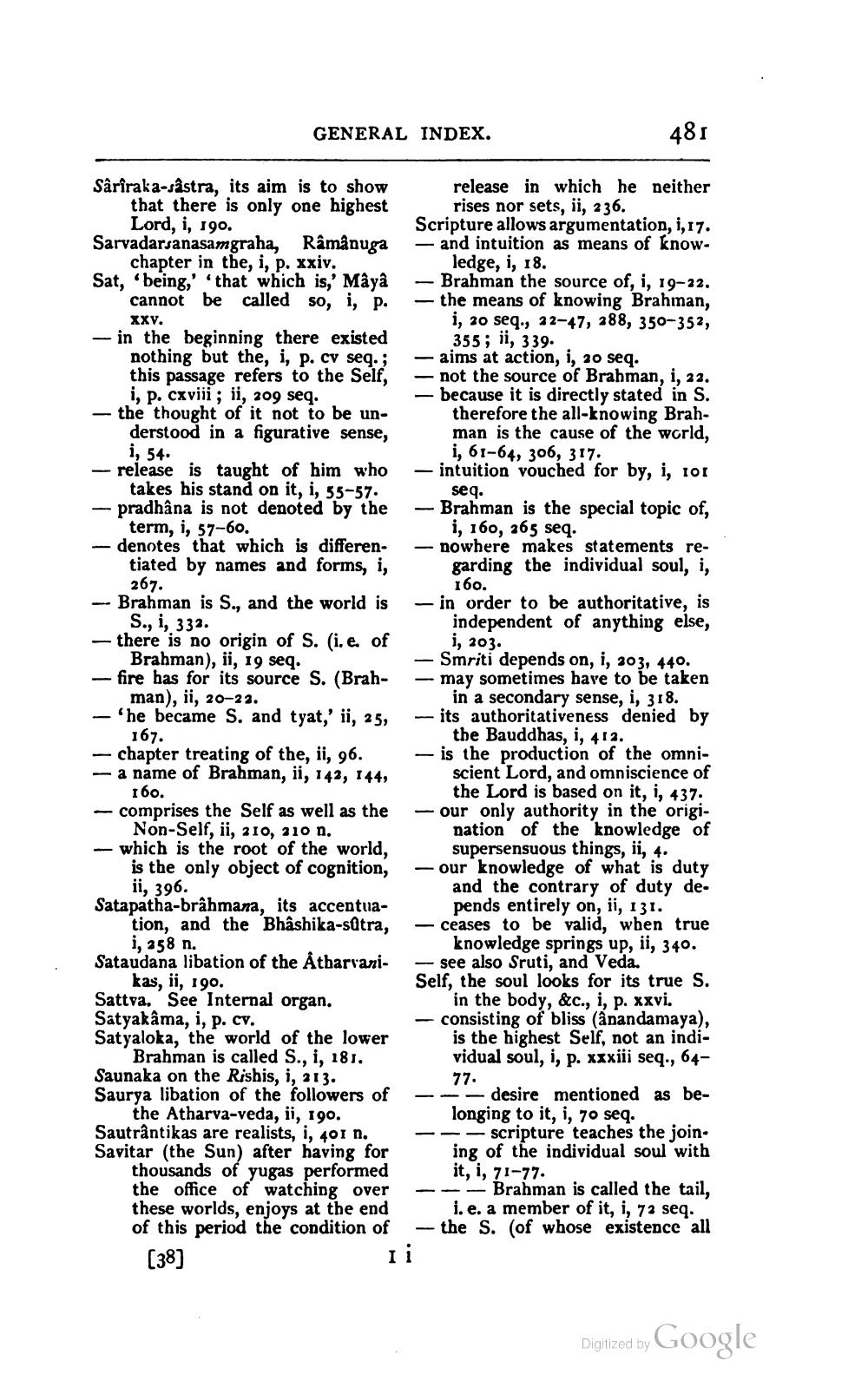________________
GENERAL INDEX.
481
Sârîraka-sastra, its aim is to show
that there is only one highest
Lord, i, 190. Sarvadarsanasamgraha, Râmânuga
chapter in the, i, p. xxiv. Sat, 'being,' 'that which is,' Mâyà
cannot be called so, i, p.
xxv. - in the beginning there existed
nothing but the, i, p. cv seg.; this passage refers to the Self,
i, p. cxviii ; ii, 209 seq. - the thought of it not to be un
derstood in a figurative sense,
i, 54. - release is taught of him who
takes his stand on it, i, 55-57. - pradhana is not denoted by the
term, i, 57-60. - denotes that which is differen
tiated by names and forms, i,
267. - Brahman is S., and the world is
S., i, 332. - there is no origin of S. (i.e. of
Brahman), ii, 19 seq. - fire has for its source S. (Brah-
man), ii, 20–23. - 'he became S. and tyat,' ii, 25,
167. - chapter treating of the, ii, 96. - a name of Brahman, ii, 142, 144,
160. - comprises the Self as well as the
Non-Self, ii, 210, 210 n. - which is the root of the world,
is the only object of cognition,
ii, 396. Satapatha-brahmana, its accentua
tion, and the Bhâshika-stra,
i, 358 n. Sataudana libation of the Atharvani.
kas, ii, 190. Sattva. See Internal organ. Satyakama, i, p. cv. Satyaloka, the world of the lower
Brahman is called S., i, 181. Saunaka on the Rishis, i, 213. Saurya libation of the followers of
the Atharva-veda, ii, 190. Sautrântikas are realists, i, 401 n. Savitar (the Sun) after having for
thousands of yugas performed the office of watching over these worlds, enjoys at the end of this period the condition of
[38]
release in which he neither
rises nor sets, ii, 236. Scripture allows argumentation, i, 17. - and intuition as means of know
ledge, i, 18. - Brahman the source of, i, 19-22, - the means of knowing Brahman,
i, 20 seq., 22-47, 288, 350-352,
355 ; ii, 339. - aims at action, i, 20 seg. - not the source of Brahman, i, 22. - because it is directly stated in S.
therefore the all-knowing Brahman is the cause of the world,
i, 61-64, 306, 317. - intuition vouched for by, i, ior
seq. - Brahman is the special topic of,
i, 160, 265 seq. nowhere makes statements re
garding the individual soul, i,
160. - in order to be authoritative, is
independent of anything else,
i, 203. - Smriti depends on, i, 303, 440. - may sometimes have to be taken
in a secondary sense, i, 318. - its authoritativeness denied by
the Bauddhas, i, 412. - is the production of the omni
scient Lord, and omniscience of
the Lord is based on it, i, 437. - our only authority in the origi
nation of the knowledge of
supersensuous things, ii, 4. - our knowledge of what is duty
and the contrary of duty de.
pends entirely on, ii, 131. - ceases to be valid, when true
knowledge springs up, ii, 340. - see also Sruti, and Veda. Self, the soul looks for its true S.
in the body, &c., i, p. xxvi. - consisting of bliss (anandamaya),
is the highest Self, not an individual soul, i, p. xxxiii seq., 6477 -- desire mentioned as be
longing to it, i, 70 seq. -- scripture teaches the joining of the individual soul with
it, i, 71-77. -- - Brahman is called the tail,
i. e. a member of it, i, 72 seq. the S. (of whose existence all
oductiona omniste, i, 43 min
as be
ing of pture 20 seq.
Digized by Google




